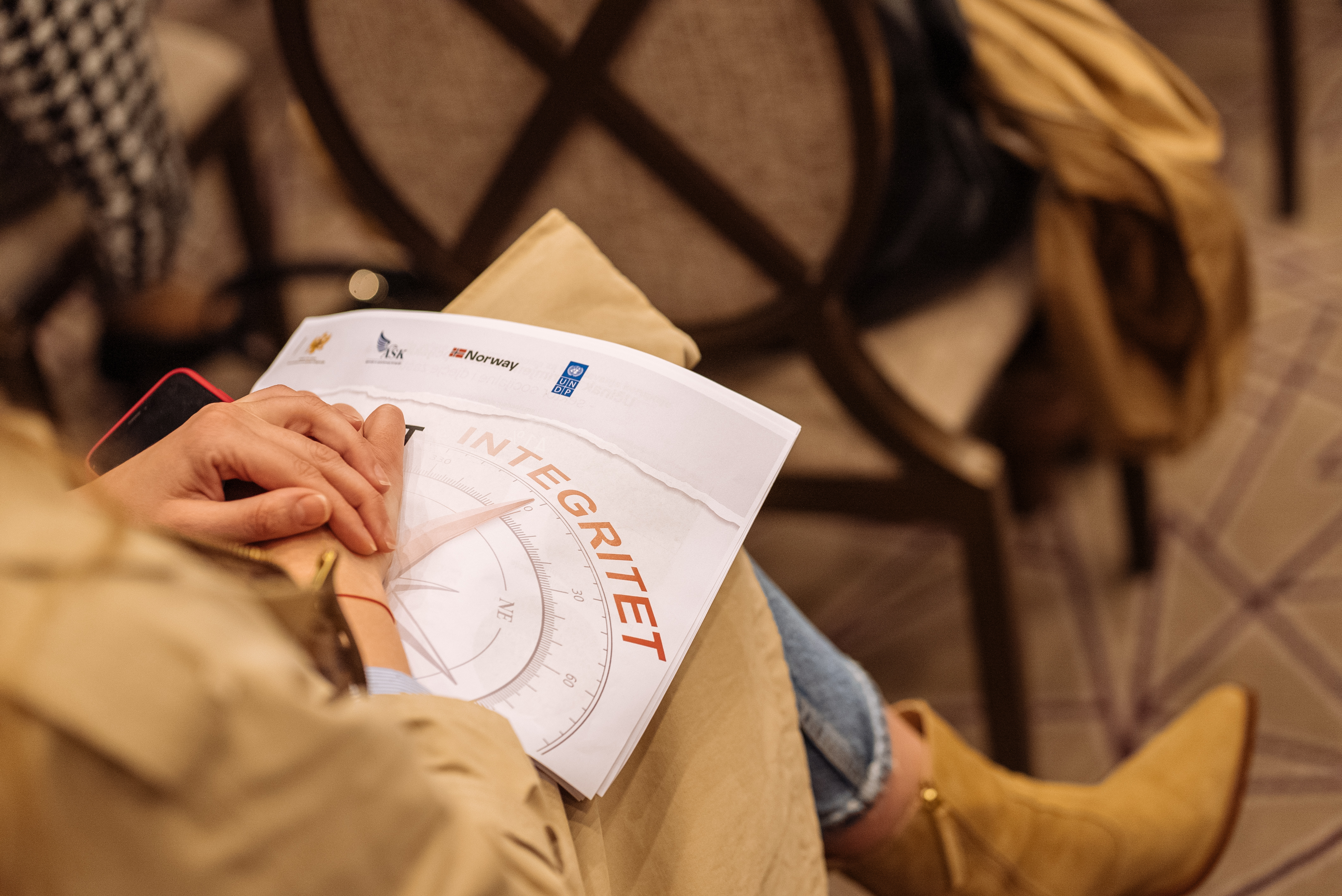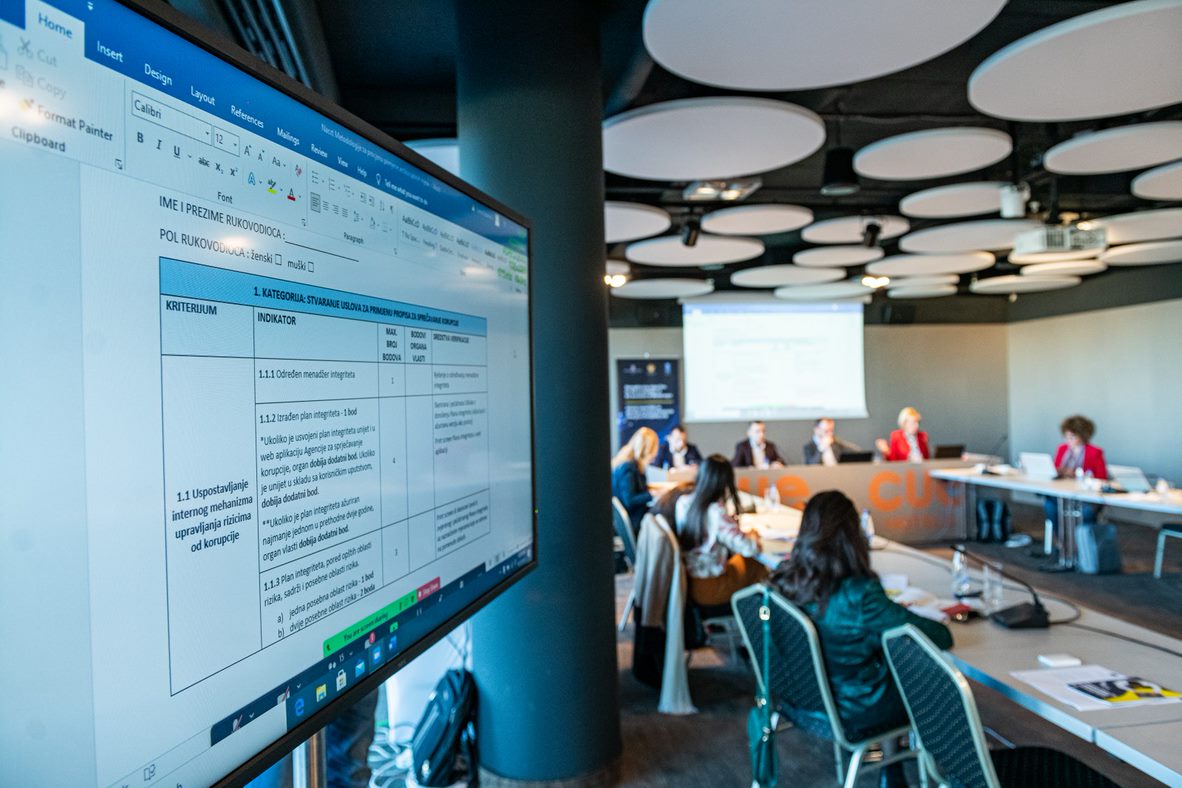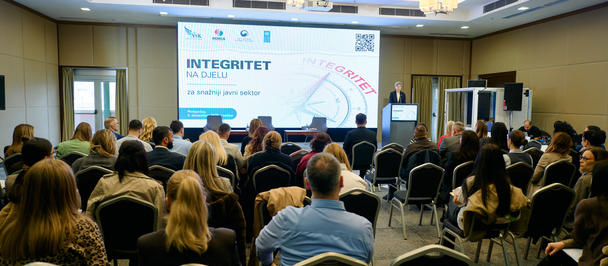Integrity in Action – A corruption-free system
July 8, 2022

Montenegro has a new tool to combat corruption. This tool, the Methodology for Assessing the Implementation of Anticorruption Measures, is designed to foster public authorities to pursue policies that have citizens and their interests at heart.
Corruption risks may arise in any area of a public authority’s operation, be it finance, procurement, recruitment, or information security. Identifying and assessing such risks, and subsequently defining proper offsetting measures increase institutional resilience to corruption. A public authority’s operation being underpinned by integrity translates into low corruption levels.
The Methodology was piloted in cooperation with state administration authorities and with the social and child protection institutions in order to measure performance of the two systems in applying not only mandatory provisions, but also some non-binding measures which may assist in building systems which are more resilient to corruption.
In developing the tool, the Agency for Prevention of Corruption (APC) was inspired by the recommendations from the methodology applied by the Republic of Korea’s Anti-Corruption and Civil Rights Commission, which suggest the interested countries to start the process with a few simple and measurable criteria.
“Although many counties are interested in adopting effective measures to prevent corruption, the fact that Montenegro, in cooperation with Korea, already improved its methodology, testifies to Montenegro’s commitment to anticorruption efforts and innovation in that respect”, Ahjung Lee, Governance Portfolio Manager and Policy Specialist at the UNDP Seoul Policy Centre, stressed.
Marko Škerović, Adviser at the APC Department for Integrity and Lobbying, noted that the earnest intention of Integrity Managers and their co-workers to improve the implementation of anticorruption tools, Integrity Plans in particular, was evident already during the workshops co-organised by UNDP and the APC. “On the occasion, Integrity Managers gave invaluable inputs and suggestions for improving the Methodology, and partook quite actively in all ensuing activities under the project“, Škerović stated.
According to him, the particular worth of the project is seen in the fact that it prompted Integrity Managers to mutual cooperation, exchanging of experiences, and sharing of knowledge and ideas, seeking through such networking to reach some joint solutions for common issues in their anticorruption efforts, in developing procedures and other enactments, and in meeting the requirements set by the Methodology.
How instrumental the Methodology proved to be for social and child protection institutions to be more proactive in adopting internal tools for fostering integrity is best illustrated by the best performing institutions from the sector. The Day Care Centre for Children and Youth with Disabilities Podgorica is the best performer in implementing anticorruption measures (71.53%), followed by the Nursing Home Podgorica (70.97%).

“From the day our institution was established it aimed, first and foremost, to ensure safety and security of our beneficiaries, so we put in place a number of procedures governing that area. The application of the Methodology encouraged us to adopt a number of other internal rules which are not strictly related to physical security alone, but rather the protection of beneficiaries and personnel in a broader sense”, stressed Mirela Feratović, Integrity Manager of the Podgorica-based Day Care Centre for Children and Youth with Disabilities.
During the implementation of the Methodology, this institution adopted eight new internal rules, which attests to the tool’s effectiveness. The rules, among other things, govern the conflict of interests situations, receiving gifts and actions to be taken by staff in such instances, the procedure for acting upon whistle-blower reports, which ultimately accounted for their best performance in the sector.
The Day Care Centre already applied some of the recommendations issued by the APC.
“We will see to it that the procedures and internal rules are actually applied in practice“, Mirela reiterated and added that, in continuous dialogue with their staff, the Day Care Centre will build an environment that encourages potential whistle-blowers to come forward.
Apart from the dialogue with the staff, cooperation with the APC is essential, and the Day Care Centre staff are quite pleased with such cooperation so far. “The APC colleagues have been with us every step of the way when developing the Methodology, but also the Integrity Plan and reporting on its implementation. Very patiently, they repeatedly provided clarifications and helped resolve dilemmas“, Mirela noted.
Asked about successful anticorruption tools applied in their institution, Mirela singled out the designation of three different persons in charge of anticorruption actions, namely the Integrity Manager, the person designated to receive and act upon whistle-blower reports, and the person responsible or ethics, integrity and anticorruption. This was recognised as an example of good practice when assessing performance of the social and child protection system.
Mirela believes that the implementation of anticorruption measures is equally important for both the staff and beneficiaries.
“Regular posting of information is a good tool in curbing corruption. Going forward, we need to further build the knowledge and skills among our staff and managers concerning the importance of anticorruption efforts“, she noted.
She considers that designating the person trusted by their co-workers to receive whistle-blower reports is the key to building a robust anticorruption environment.
“As regards our beneficiaries, one of the most important rules is the one governing gifts and actions to be taken by staff members in such instances, which will prevent favouritism among beneficiaries and guarantee that equal service is delivered to all“, Mirela noted.
The Nursing Home Podgorica, as the second-ranked among the best performing institutions, see the application of anticorruption measures as a key precondition for clear understanding of staff roles, operational rules and responsibilities.
“These measure ensure transparency, participation in decision-making, greater ownership, trustworthiness, better inter-personal relations and equal treatment for all staff members. An example of the benefit of applying the measures are clearly defined rules, instructions for actions and possible sanctions”, the Integrity Manager, Zorica Bašanović, stressed.
Although the institution is not officially open for receiving beneficiaries yet, the legal procedures for creating a corruption-free environment that will guarantee that services are offered to the ones who really need them have already been developed. Thanks to the Methodology, the Nursing Home adopted nine new procedures governing, among other things, receiving gifts, the rules for delivering other tasks, designation of persons for receiving and acting upon whistle-blower reports.
The cooperation with the APC, in Zorica’s words, is outstanding. “They deserve all the praise for their patience, and being so informative and supportive.”
Asked about successful anticorruption tools, Zorica stressed transparency which is conducive to building public trust in their work.
Zorica noted that in future the Nursing Home will continue to establish cooperation with relevant institutions and the civil society towards building public trust and train staff in matters of ethics and integrity.
The development of the Methodology was supported within the project “Strengthening capacities for the acceleration of EU accession of Montenegro”, funded by the Norwegian Ministry of Foreign Affairs and implemented by the United Nations Development Program (UNDP), in cooperation with the Office for European Integration and the Secretariat General of the Government.

 Locations
Locations



